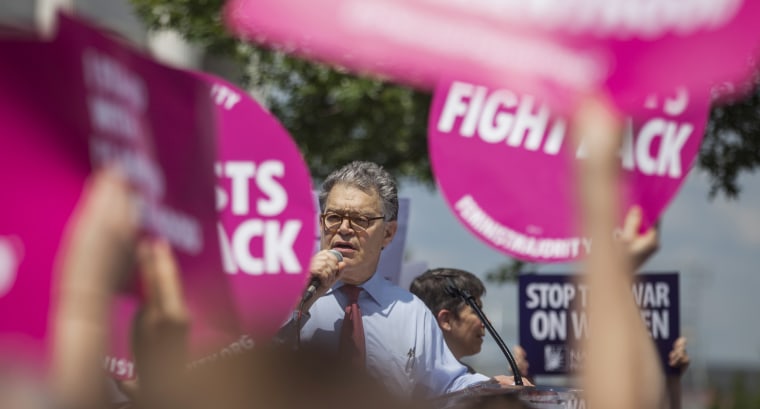No one wants to think of someone they love, or anyone they know and respect, as a monster. But in the wake of the Weinstein allegations, as more and more people have come forward to detail their stories of harassment and assault — including Thursday, when Leeann Tweeden wrote about a non-consensual kiss and released a picture of Senator Al Franken (D-Minn.) apparently groping her as she slept — more and more people are having to ask themselves, as Sarah Silverman did on her Hulu show "I Love You, America," “Can you love someone who did bad things?”
Before joining my current law firm, I spent nearly three years investigating almost 200 reports of possible discrimination on college campuses. I listened to dozens of students accused of sexual assault or harassment admit to their actions and behaviors but deny responsibility. “I’m a good person…this isn’t me,” they would often say. Similarly, many parents told me that their adult children were incapable of wrongdoing because they were “good kids.”
In Dustin Hoffman's apology after being accused of harassment, he, too, separated his alleged behavior from his identity, saying, “it is not reflective of who I am.” George Takei denied engaging in “non-consensual acts” after he was accused of assaulting a young model in 1981, saying that such acts “are anathema to me and my personal code of conduct.” And in Franken's second statement to reporters over the incident with Tweeden, he also took pains to separate his stated beliefs from the conduct for which he apologized, stating, "I respect women. I don't respect men who don't. And the fact that my own actions have given people a good reason to doubt that makes me feel ashamed."
In another case, former colleagues of a professor facing a Congressional investigation over “[d]isturbing allegations of sexual harassment in Antarctica,” similarly expressed disbelief that someone who is “charming and charismatic, a very good scientist, and an excellent teacher” could be the monster described in the complaints against him.
Focusing on what kind of person someone is can be a distancing technique that helps us forget that even good people can do bad things.
But sometimes focusing on what kind of person someone is — on their character — can be a distancing technique that helps us forget that even good people can do bad things. As new headlines surface daily over allegations of sexual harassment and sexual assault in Hollywood, news rooms, college sports, academia, international politics and the White House, so do new expressions of shocked disbelief. Often, that disbelief is not over whether the allegation is true, but whether someone respected and admired could engage in such hurtful, destructive behaviors. As a colleague recently said, sometimes “it’s just hard to believe there could be that many monsters.”
Thinking that such behaviors can come only from a place other than human, however, is a form of “othering.” When we think of an individual or group as not one of us, it puts emotional and psychological distance between “us” and “them,” according to Anna Harper-Guerrero, executive vice president of Emerge! Center Against Domestic Abuse.
Such distancing opens the door to some flawed, but appealing, logic: people who do bad things are other people — monsters— and not “us.”
Sometimes distancing lets people avoid thinking of themselves as abusers and facing the consequences of their behavior. For example, a study by researcher and psychologist David Lisak found that in a survey of 1,880 college men, six percent admitted to “acts that met the legal definitions of rape or attempted rape.” But most did not think of themselves as rapists.
It is comforting to think that horrendous acts are committed only by horrendous people. But what if we approached the current swell of sexual harassment allegations remembering that people just like us can do things that we would not do, and that not everyone who engages in bad behavior is the kind of monster we see in the movies?
Maybe when the next wave of allegations hits, we would not be as shocked by the “magnitude of the problem.” We could recognize that sexual harassment and assault are real, serious problems while opting out of character debates about whether anyone is a good person or a monster. We can do both without assuming an accusation, by itself, means someone is guilty or someone is lying. We could focus on other questions like, “What happened?” “How do we know?” and “What needs to happen next?”
We also could ask some important questions of ourselves: “Is sexual harassment a problem in my school, workplace, or organization?” “How would I know?” and “What can I do about it?” If we recognized that ordinary, flawed people can do horrible things and, under certain conditions, are more likely to do them, we might finally begin to address the conditions that made unacceptable behavior acceptable for so long.
Alexandra Tracy-Ramirez is a Public Voices Fellow with the OpEd Project, a former college administrator and an attorney who represents students, faculty or school staff in cases involving discrimination, harassment and other Title IX violations.

